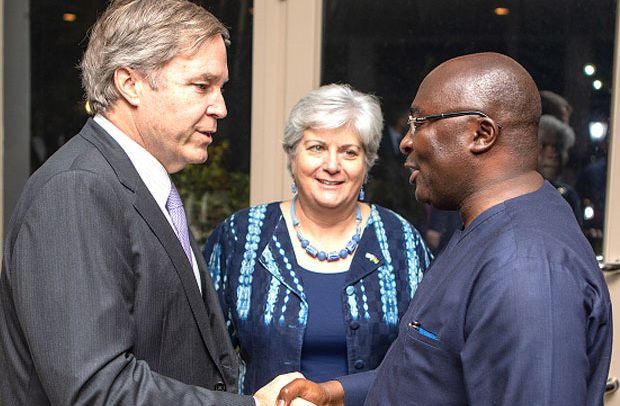Vice President Dr Bawumia shakes hands with Mr David MacLennan as US Ambassador Stephanie S. Sullivan looks on.
CARGILL HAS announced a US$13 million investment in the expansion of its cocoa processing site in Tema, Ghana, to increase production capacity by 20%.
Cargill has also committed US$3.4 million to Ghanaian community sustainability programmes and cocoa traceability efforts.
These programmes are billed to enhance the safety and wellbeing of children and families in cocoa farming areas as well as provide a more transparent, traceable cocoa supply chain for customers and consumers,
Cargill Chief Executive, David MacLennan, who disclosed these, was speaking at a dinner hosted by the U.S Ambassador to Ghana, Stephanie S. Sullivan, in his honour as part of activities marking his industrial visit to Ghana.
Vice President Dr. Mahamudu Bawumia was the special guest.
Mr. MacLennan, who was in Ghana with a team of top Cargill executives, said the visit was to afford Cargill the opportunity to deepen its relationship with the Ghana’s government and stakeholders of the cocoa industry as well as inspect and announce new investments in Ghana.
He also visited the Cargill cocoa processing site where Mr. MacLennan laid the first stone to symbolize the expansion works and the Akodzo Basic School in Tema, one of the educational projects under the Cargill Cocoa Promise.
Commenting on this new project, Managing Director of Cargill’s cocoa and chocolate business in Ghana, Aedo van der Weij, says the company wants to meet customer demand as well as continuously work with the government and other key stakeholders to create economic opportunities and build sustainable local businesses.
He further noted that Cargill’s investment of US$3.4 million over the next three years in Ghana’s community projects and supply chain traceability has a focus on creating stronger, more resilient cocoa farming communities. These projects are part of the Cargill Cocoa Promise: the company’s corporate commitment to improving the lives of cocoa farmers and their communities. It will also involve the building of six new schools as well as the implementation of a Child Labor Monitoring and Remediation System (CLMRS) with the International Cocoa Initiative (ICI) to include 8,000 farmers and their families
“This is exactly what we are looking for with our economic programme; to have more private sector players expand industrialization efforts and create jobs for our youth” Dr Bawumia said.


